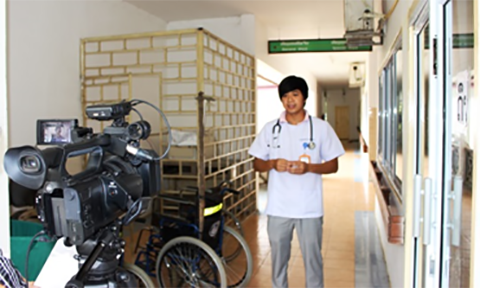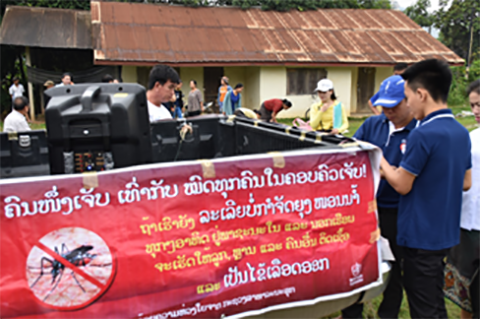9 August 2017, Vientiane Province - Since the start of the rainy season in July this year, the number of dengue cases has been increasing in several provinces including Vientiane Capital and Province, Champassack, Savannakhet, Salavanh, Khammuane and Bolikhamxay provinces.
In Vientiane Province, Vang Vieng District, a popular tourist destination, efforts are made by the local authorities to stop dengue transmission by providing dengue prevention messages and vector control clean-up activities with the communities.
Vang Vieng District Health Office and Hospital

The Centre of Information and Education for Health is producing a video on dengue prevention and transmission and advised everyone to take precaution against dengue and to protect themselves.

Dengue should be suspected when a high fever (40°C/104°F) is accompanied by two of the following symptoms: severe headache, pain behind the eyes, muscle and joint pains, nausea, vomiting, swollen glands or rash. Symptoms usually last
for 2–7 days after an incubation period of 4–10 days after the bite from an infected mosquito.
Severe dengue is a potentially deadly complication due to plasma leaking, fluid accumulation, respiratory distress, severe bleeding, or organ impairment. Warning signs occur 3–7 days after the first symptoms in conjunction with a decrease in temperature (below 38°C/100°F) and include: severe abdominal pain, persistent vomiting, and rapid breathing, bleeding gums, fatigue, restlessness and blood in vomit. The next 24–48 hours of the critical stage can be lethal; proper medical care is needed to avoid complications and risk of death.
For severe dengue, medical care by physicians and nurses experienced with the effects and progression of the disease can save lives – decreasing mortality rates from more than 20% to less than 1%. Maintenance of the patient's body fluid volume is critical to severe dengue care

Community clears mosquito breeding sites in Ban Phonsu
Villagers in Ban Phonsu have gathered since learning about the increase in dengue cases in their village. In this community mobilization activity, they learned that it is important to clear their homes and surrounding areas of mosquito breeding sites, at least once a week.



The main method to control or prevent the transmission of dengue virus is to combat vector mosquitoes through:
- preventing mosquitoes from accessing egg-laying habitats by environmental management and modification;
- disposing of solid waste properly and removing artificial man-made habitats;
- covering, emptying and cleaning of domestic water storage containers on a weekly basis;
- applying appropriate insecticides to water storage outdoor containers;
- using of personal household protection such as window screens, long-sleeved clothes, insecticide treated materials, coils and vaporizers;
- improving community participation and mobilization for sustained vector control;
- applying insecticides as space spraying during outbreaks as one of the emergency vector-control measures;
- active monitoring and surveillance of vectors should be carried out to determine effectiveness of control interventions.

